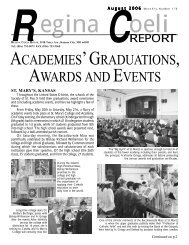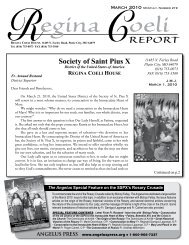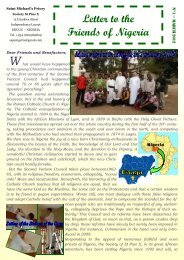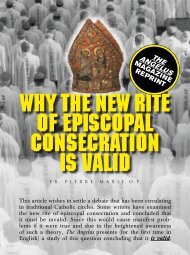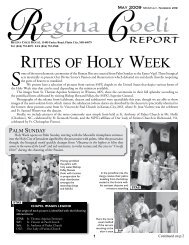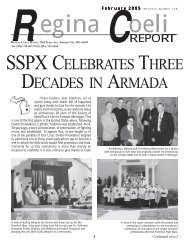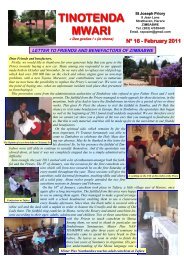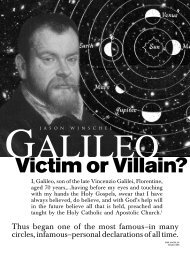Is Feeneyism Catholic? - Society of St. Pius X
Is Feeneyism Catholic? - Society of St. Pius X
Is Feeneyism Catholic? - Society of St. Pius X
Create successful ePaper yourself
Turn your PDF publications into a flip-book with our unique Google optimized e-Paper software.
A NSWER TO OBJECTIONS 105<br />
be believed, and the absolute certitude <strong>of</strong> its divine source. <strong>St</strong>.<br />
Thomas Aquinas teaches this explicitly, and his teaching has been<br />
followed on this point by the Church:<br />
We must hold very certainly that God would reveal to him<br />
either through an internal inspiration those truths that ought to<br />
be believed, or would send him a preacher <strong>of</strong> the Faith, as He<br />
sent Peter to Cornelius. 155<br />
Someone knowing the object <strong>of</strong> Faith through a false religion<br />
could receive such light. But then this light, when faithfully received,<br />
casts away the darkness <strong>of</strong> the errors <strong>of</strong> that false religion,<br />
and such a person is no longer formally <strong>of</strong> that false religion, but<br />
rather like a catechumen <strong>of</strong> the <strong>Catholic</strong> Church. But do not misunderstand<br />
me: Protestants claim that each one has such lights;<br />
however, Our Lord has told us: “by their fruits you shall know<br />
them.” We recognize that such an internal inspiration comes from<br />
the Holy Ghost when its object is the <strong>Catholic</strong> Faith, and we recognize<br />
that it does not come from the Holy Ghost when its object<br />
is not in conformity with the <strong>Catholic</strong> Faith. Hence Protestants<br />
are wrong to claim such lights against the true Faith. But that does<br />
not exclude that God does give such lights to whom He wills.<br />
WHAT IS THE NECESSITY OF THE<br />
EXTERIOR BELONGING TO THE CHURCH?<br />
Given the nature <strong>of</strong> man, body and soul, and above all given<br />
the very mystery <strong>of</strong> the Incarnation, the exterior belonging to the<br />
Church naturally accompanies its interior belonging. To deny the<br />
importance <strong>of</strong> the exterior belonging to the Mystical Body <strong>of</strong><br />
Christ, is akin to the denial <strong>of</strong> the visibility <strong>of</strong> the Church, and<br />
akin to the denial <strong>of</strong> the Incarnation.<br />
A man can live without a foot, yet his body is not complete<br />
without it. A saint can be in heaven without his body, yet his beatitude<br />
is not complete without the resurrection <strong>of</strong> the body; his<br />
beatitude is perfect, though not complete: it is perfect because the<br />
glorification <strong>of</strong> his body is not going to give him a more excellent<br />
bliss, but it is not complete because his body is an integral part <strong>of</strong><br />
himself.<br />
155 De Veritate, Q.14, A.11, ad 1.



